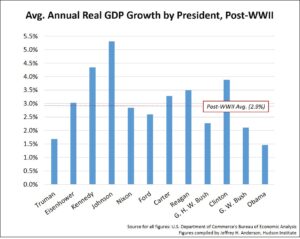Real GDP Growth Trends: What Economic Cycles Tell Us About the Outlook
Understanding real GDP growth trends is one of the most reliable ways to evaluate the underlying strength of the economy. While short-term data often fluctuates, GDP provides a broader, more stable view of how economic activity evolves over time.
For homeowners, buyers, and investors, GDP trends matter because they directly influence employment, income growth, housing demand, and long-term real estate performance.
How Real GDP Growth Typically Evolves


Historically, real GDP growth tends to strengthen and peak during the middle phase of an economic cycle. This occurs as expansion gains traction through:
- Increased consumer spending
- Higher business investment
- Expanding employment and wage growth
GDP is considered a lagging but confirming indicator. Strong GDP readings often appear after economic momentum is already underway, which is why housing activity and buyer confidence often improve before GDP peaks.
Why GDP Growth Matters for Housing and Real Estate
Strong GDP growth is closely tied to real estate fundamentals. As economic activity expands:
- Job creation supports household formation
- Income growth improves affordability
- Demand for both owner-occupied and investment properties increases
Historically, periods of sustained GDP growth align with healthy housing demand, even if price growth moderates.
This is especially important for buyers evaluating timing, and for homeowners considering long-term equity planning.
How GDP Growth and Financial Markets Differ


Financial markets are forward-looking, often pricing in expectations well before GDP data reflects them. As a result, market performance and GDP growth do not always peak at the same time.
This distinction matters in real estate because housing activity tends to follow real economic conditions, not short-term market sentiment. GDP growth provides confirmation that demand is supported by income and employment—not speculation alone.
GDP Growth and Mortgage Planning
GDP trends also influence mortgage strategy indirectly. Strong economic growth environments often coincide with:
- Increased loan demand
- Greater borrower confidence
- Strategic opportunities for refinancing or purchase planning
Understanding where the economy sits in the growth cycle can help borrowers make more informed mortgage decisions, particularly for long-term financing strategies.
Planning Takeaways for Buyers and Homeowners
For buyers, homeowners, and long-term investors, GDP growth trends help frame expectations around:
- Housing demand sustainability
- Income and employment stability
- Long-term property value support
Strong GDP growth environments tend to reward disciplined planning and thoughtful timing, rather than reactive decision-making.
Final Thoughts on GDP and Economic Cycles
While no single indicator tells the full story, real GDP growth remains one of the most dependable measures of economic health. Historical trends show that GDP often strengthens as economic cycles mature, even when markets appear uneven.
For those making housing or mortgage decisions, understanding GDP trends provides valuable context—helping align real estate strategy with the broader economic environment.
If you’d like to discuss how current GDP trends may relate to housing, real estate, or mortgage planning, I’m always happy to connect.
From Strip Views to Suburban Luxury: The Real Cost of Owning in Las Vegas

Las Vegas is one of the few cities in America where you can choose between two completely different lifestyles — the excitement of high-rise living on the Strip or the comfort and quiet of suburban luxury in communities like Summerlin, Henderson, and the Northwest. Both offer incredible benefits, but the real cost of ownershipbetween them can be dramatically different.
Whether you’re relocating, upgrading, or investing, understanding the true monthly costs — not just the purchase price — can help you make the smartest decision for your budget and lifestyle.
1. High-Rise Living: What You’re Really Paying For
High-rise condos offer unbeatable amenities and views, but ownership comes with expenses that are different from traditional homes.
Breakdown of typical costs for Strip-area high-rises:
- Mortgage payment(varies by loan type and tower)
- HOA fees:$600–$1,600 per month on average, and up to $2,500+ in ultra-luxury buildings
- Parking fees(in select towers)
- Special assessments(depending on building upgrades or repairs)
- Higher insurance requirements
What you’re getting:
- 24/7 concierge + security
- Resort-style pools
- Fitness centers, spas, lounges
- Valet parking
- Strip views and walkability
- Lock-and-leave convenience
The value:You’re buying a lifestyle, not just a unit. The all-inclusive amenities and prime location explain the premium.
Who it’s ideal for:
- Professionals
- Retirees wanting zero maintenance
- Frequent travelers
- Investors seeking mid-term rental opportunities
- Buyers who value views, security, and luxury amenities
2. Suburban Luxury: What Ownership Really Costs
Las Vegas suburbs are known for space, privacy, modern floor plans, and upscale communities. Costs are structured differently and usually more predictable.
Typical suburban ownership costs:
- Mortgage payment
- HOA fees:$50–$200 per month (higher for guard-gated communities)
- Utilities:Higher due to square footage
- Maintenance:Landscaping, pool upkeep, repairs
- Home insurance:Typically lower than high-rise insurance
What you’re getting:
- Larger square footage
- Private yards
- Family-friendly neighborhoods
- Community parks, trails, and recreation centers
- Stronger school zones (Henderson + Summerlin)
The value:More space, more privacy, and long-term appreciation potential.
Who it’s ideal for:
- Families
- Remote workers
- Buyers wanting long-term equity growth
- Investors seeking rental demand
- Anyone valuing space over amenities
3. Price Comparison: High-Rise vs. Suburban Luxury
Here’s a realistic snapshot of today’s pricing:
High-Rise (Strip + near-Strip)
- Entry-level: $300,000–$450,000
- Mid-luxury towers: $450,000–$850,000
- Luxury Strip towers: $900,000–$3M+
- HOA fees: $600–$2,500+/mo
Suburban Luxury (Summerlin, Henderson, NW)
- Entry-level single-family: $430,000–$550,000
- Modern, upgraded homes: $650,000–$950,000
- Luxury homes: $1M–$4M+
- HOA fees: $50–$200/mo
- Larger maintenance expenses
Key takeaway:
High-rise condos often have a lower purchase price but higher monthly carrying costs.
Suburban homes often cost more upfront but offer lower ongoing fees.
4. Appreciation & Investment Potential
Both segments appreciate differently.
High-Rise Appreciation:
- More sensitive to interest rates
- Influenced by building litigation, reserves, and HOA strength
- Strong rental potential for 30+ day leases
- High demand from out-of-state buyers
Suburban Home Appreciation:
- Historically stronger, more stable
- Driven by population growth and job expansion
- Higher resale demand
- Less volatility
If your goal is long-term wealth building, suburban homes typically outperform high-rise units. If your goal is lifestyle or mid-term rental potential, high-rises shine.
5. Lifestyle Differences That Affect Cost
The biggest financial difference often comes down to how you live.
High-Rise Pros:
- Zero maintenance
- No yard work
- Security + concierge
- Walkability
- Resort amenities
- Downsize-friendly
Suburban Pros:
- Privacy
- Outdoor space
- Better for pets
- Family-friendly communities
- Garage parking and storage
- More flexibility for renovations
Which lifestyle matches your daily life and long-term goals?
6. Which Option Is More Affordable in the Long Run?
If you prefer lower monthly expenses and long-term equity:
Suburban homes win.
If you want luxury living with no maintenance and don’t mind higher monthly fees:
High-rises are unbeatable.
If you’re an investor looking for mid-term rentals:
High-rises can perform extremely wellin corporate + travel-nurse markets.
If you’re planning to raise a family or want a backyard:
Suburbs dominate.
Final Thoughts
Las Vegas offers two incredible lifestyles:
Strip-facing high-rise excitementor suburban luxury comfort.
The real cost of ownership comes down to HOA fees, maintenance, and the lifestyle you’re choosing — not just the home price.
If you want to compare payments, HOA structures, loan types, and long-term affordability, connect withThe Derek Parent Team. We specialize in both high-rise and suburban financing, and we’ll help you make the smartest financial decision for your next move.
The Ultimate Guide to Financing a High-Rise Condo in Las Vegas

Financing a high-rise condo isn’t the same as financing a traditional single-family home. In Las Vegas—where the high-rise market includes iconic towers like Veer Towers, The Martin, Turnberry, Panorama, and Sky—buyers often run into unique lending requirements that many lenders simply don’t understand.
Whether you're buying a primary residence, second home, or investment unit, this guide breaks down everything you need to know to successfully finance a high-rise condo in Las Vegas.
1. Understanding High-Rise Condo Financing (and Why It’s Different)
High-rise loans come with additional layers of review because lenders must evaluate both your financialsand the building’s financial health.
This includes:
- HOA financials
- Budget and reserves
- Litigation
- Insurance coverage
- Owner-occupancy ratios
- Single-entity ownership percentages
One issue in the building can limit financing options—even if youare fully qualified.
That’s why buyers should work with a lender who knows the high-rise landscape inside and out.
2. Warrantable vs. Non-Warrantable Condos
The biggest factor in high-rise financing is determining whether the building is warrantableor non-warrantable.
Warrantable Condos
These meet Fannie Mae/Freddie Mac guidelines, meaning you can use:
- Conventional loans
- Lower down payments
- Competitive interest rates
Most major towers are warrantable, but this can change if the HOA is dealing with litigation or low reserves.
Non-Warrantable Condos
These do notmeet agency guidelines and require:
- Portfolio loans
- Higher down payments (usually 20–30%)
- Slightly higher rates
- More documentation
Some of Vegas’ most popular luxury towers periodically fall into this category depending on the building’s condition or legal status.
3. Down Payment Requirements for High-Rise Condos
Your down payment depends on whether the building is warrantable and what type of loan you’re using.
Typical requirements:
- Primary residence (warrantable):5–10% down
- Second home:10% down
- Investment property:20–25% down
- Non-warrantable building:20–30% down
Jumbo high-rise units may require additional reserves or stricter qualification guidelines.
4. Understanding HOA Requirements and Fees
High-rise HOA fees are typically higher than traditional condos because they cover:
- Concierge services
- Valet
- Security
- Amenities (gym, pool, spa, lounge)
- Maintenance
- Utilities in some buildings (water, internet, trash, etc.)
Lenders must verify HOA stability. Low reserves or pending assessments can directly impact loan approval.
Pro tip:Before making an offer, ask your lender whether the building is already approved. The Derek Parent Team keeps an updated high-rise building approval list.
5. Jumbo Loans for Luxury High-Rise Units
Many Strip-facing high-rise units exceed conforming loan limits, requiring a jumbo loan.
Jumbo loans typically require:
- 700+ credit scores
- Strong income documentation
- 6–12 months of reserves
- 10–20% down minimum
The good news? Jumbo rates have become more competitive and often closely match conventional pricing.
6. Investment Property Financing
Las Vegas high-rises are popular for:
- Corporate rentals
- Traveling nurse housing
- Longer-term furnished rentals
- Second homes
While most high-rises restrict nightly rentals, many allow 30-day minimum leases, making them attractive for mid-term investors.
To finance an investment high-rise, expect:
- 20–25% down
- Higher debt-to-income scrutiny
- DSCR loan options for certain buildings
Your lender must confirm rental restrictions upfront.
7. Common Issues That Can Delay High-Rise Approval
High-rise loans require extra due diligence, so delays can happen—especially with inexperienced lenders.
Common issues include:
- HOA insurance policy gaps
- Pending litigation
- Low building reserves
- Too many investors in the building
- One owner holding too many units
- Incomplete condo questionnaires
Working with a lender familiar with each building significantly reduces delays.
8. Why You Need a High-Rise Specialist
High-rise lending is a niche inside the mortgage industry. Most big-box lenders and online mortgage companies struggle with:
- Warrantability reviews
- HOA document analysis
- Non-warrantable programs
- Jumbo portfolio approvals
- Building-specific nuances
As the original in-house lender for Veer Towers, Derek Parent is one of the most experienced high-rise lenders in the city, with decades of experience financing units across the Strip and beyond.
When you work with a specialist, you get:
- Faster approvals
- Access to warrantable + non-warrantable programs
- Accurate building information
- No last-minute surprises
- Smoother closings
Final Thoughts
Financing a high-rise condo in Las Vegas is incredibly doable—but only when you work with the right team and know what to expect. From warrantability to HOA reviews to jumbo financing, the process requires local expertise and a lender who understands each tower’s unique requirements.
If you’re considering buying a Las Vegas high-rise, connect withThe Derek Parent Team. We’ll help you navigate financing options, compare buildings, and secure the right loan for your goals.
Homeowners Are Sitting on Billions in Untapped Equity — Here’s How to Use Yours Wisely

Homeowners across the U.S. — especially in fast-growing markets like Las Vegas — are sitting on massive amounts of tappable equity. In fact, recent housing data shows Americans now have more than $16 trillionin home equity, with billions of that right here in Nevada.
But the big question is this:
What should you actually do with that equity?
Used wisely, your home equity can help you build wealth, eliminate debt, invest in your future, and strengthen your financial foundation. Used carelessly, it can create unnecessary risk.
Here’s how to use your equity strategically and responsibly.
1. Consolidate High-Interest Debt
Credit card interest rates are now averaging 20–30%, and many homeowners are feeling the pressure. If you’re carrying high-interest balances, a cash-out refinanceor HELOCcan dramatically reduce your monthly obligations.
Why this strategy works:
- Mortgage rates are significantly lower than credit card rates
- One consolidated payment is easier to manage
- Lower utilization often boosts your credit score
- Freeing up cash flow reduces financial stress
This is one of the smartest, most impactful uses of home equity — especially heading into 2026 with rising consumer debt.
2. Make High-ROI Home Improvements
Renovations can increase property value, improve your living space, and boost long-term equity. But not all upgrades are created equal.
High-return improvements include:
- Kitchen remodels
- Bathroom upgrades
- New flooring
- Exterior improvements for curb appeal
- Energy-efficient windows
- HVAC upgrades
A cash-out refinance or HELOC often makes more financial sense than personal loans or store financing, which carry higher rates.
3. Buy an Investment Property
If you’ve built strong equity and want to grow wealth, using that equity for a down payment on a rental or investment propertycan create long-term returns.
Benefits include:
- Additional monthly income
- Appreciation on multiple properties
- Tax benefits for investors
- A hedge against inflation
Many of your clients are leveraging their primary home equity to purchase:
- Long-term rentals
- Mid-term furnished units
- High-rise condos
- Second homes in Las Vegas communities
This is how homeowners move from paying a mortgage… to building a portfolio.
4. Refinance Into a Better Loan
Even if rates today aren’t at historic lows, refinancing can still make sense, especially if you can:
- Remove mortgage insurance (PMI)
- Switch from an ARM to a fixed-rate mortgage
- Shorten your term (30-year to 15-year)
- Reduce your interest rate
- Lower your monthly payment
If you bought in the mid-rate years and your equity has climbed, refinancing may open doors that weren’t available when you closed originally.
5. Build an Emergency or Opportunity Fund
Another smart equity move is pulling a conservative amount of cash for liquidity — not spending.
This gives homeowners:
- A financial safety net
- Funds for unexpected medical or family expenses
- Capital to jump on investment opportunities
- Flexibility during job changes or business transitions
A HELOC is especially useful for this because you only pay interest on what you use.
6. Prepare for Major Life Events
Your equity can help you navigate big moments with less financial strain.
Examples include:
- Paying for college tuition
- Funding a wedding
- Helping a family member buy a home
- Covering medical or caregiving expenses
- Preparing for retirement transitions
Instead of draining savings, homeowners can strategically tap equity to protect cash reserves.
7. Don’t Use Equity for “Lifestyle Debt”
Before leveraging your equity, it’s just as important to know what notto use it for.
Avoid spending equity on:
- Vacations
- Luxury purchases
- Vehicles
- Consumables
- Short-lived expenses
These reduce your net worth without creating long-term value.
How to Know Which Strategy Fits You Best
The right equity move depends on your goals:
- Want lower monthly expenses?
Debt consolidation or refi into a lower rate. - Want long-term wealth?
Invest in property or shorten your mortgage term. - Want flexibility?
Open a HELOC and keep funds available. - Want to upgrade your home?
Cash-out for renovations with strong ROI.
AtThe Derek Parent Team, we analyze your equity, credit, income, and goals to determine the smartest move — not just the easiest one.
Final Thoughts
Homeowners today have access to more equity than any time in history — but the real power lies in using it wisely. Whether you want to invest, reduce debt, protect your finances, or improve your home’s value, the right strategy can move you closer to your long-term financial goals.
If you’d like a customized equity analysis or want to explore cash-out, HELOC, or refinance options, connect with The Derek Parent Team. We’ll help you understand what’s possible and how to maximize your equity safely and strategically.
Why Year-End Is the Smartest Time to Buy a Home in Las Vegas

While most people are focused on holidays, travel, and year-end planning, savvy buyers are doing something different — they’re taking advantage of one of the best times of yearto buy real estate in Las Vegas.
If you’re serious about owning a home, the final months of the year offer unique advantages you won’t get in spring or summer. Here’s why year-end may be your smartest move.
1. Sellers Are More Motivated During the Holidays
By November and December, many sellers have had their homes on the market longer than expected. Whether they need to relocate, close before tax season, or simply don’t want to carry the home into the new year, seller motivation is significantly higher.
This often means:
- More price flexibility
- Faster negotiations
- Higher chance of seller-paid closing costs
- More willingness to accept contingencies
Less competition = more leverage for buyers.
2. Fewer Buyers in the Market
Most buyers pause their home search during the holidays. Kids are out of school, people travel, and money is tight — so buyer activity naturally slows down.
But that’s great news for you.
With fewer offers to compete against, you’re more likely to:
- Avoid bidding wars
- Get your first choice of home
- Negotiate better terms
- Lock in a property before demand surges in January and February
If you want less stress and more negotiating power, year-end is where it happens.
3. Builders Offer Huge Incentives Before December 31st
New construction communities LOVE closing out the year strong. Many builders — especially in Summerlin, Henderson, and the booming Northwest — offer massive incentives to hit their end-of-year sales goals.
These may include:
- Rate buydowns(including 2-1 buydowns)
- Closing cost creditsworth $10K–$25K
- Free upgradeslike flooring, appliances, or premium lots
- Discounts on quick-move-in homes
These incentives are often the best you’ll see all year.
4. You Get a Head Start Before the Spring Rush
Every January and February, buyers flood back into the market. Rates stabilize, tax refunds come in, and relocation season begins. By spring, competition spikes — and so do home prices.
Buying before the rush helps you:
- Lock in a home before demand increases
- Avoid rising list prices
- Close and move with fewer delays
- Refinance later if rates drop
You’re essentially buying low before everyone else wakes up.
5. Tax Advantages for Buying Before Year-End
Depending on your financial situation, buying before December 31st may give you access to tax benefitsincluding:
- Mortgage interest deduction
- Property tax deduction
- Possible points or buydown deductions
- First-time buyer incentives (depending on program)
Always consult with a CPA, but many homeowners enjoy meaningful tax advantages simply by closing before January 1st.
6. More Flexible Scheduling for Showings & Closings
The holiday slowdown benefits buyers beyond pricing — it also makes logistics easier.
You’ll often find:
- Faster appraisal scheduling
- Quicker underwriting
- Easier coordination with title companies
- More availability for inspections
Everything moves smoother because fewer people are buying at the same time.
7. You Can Set Yourself Up for a Strong Financial Start to 2026
Buying a home before year-end positions you to:
- Start building equity immediately
- Lock in monthly housing stability
- Avoid rising rents in the new year
- Begin 2026 with a major financial win
Instead of waiting and paying more later, you enter the new year already ahead.
Final Thoughts
Year-end might not be the most obvious time to buy a home, but in Las Vegas, it’s often the smartest. With motivated sellers, reduced competition, better builder incentives, and faster closing timelines, the final months of the year give buyers advantages they simply won’t find in spring or summer.
If you’re ready to take advantage of these benefits and explore your options, connect withThe Derek Parent Team. We’ll walk you through payments, programs, incentives, and strategies to help you buy smart — before the rest of the market jumps back in.
Credit Score Tune-Up: 7 Fixes That Strengthen Your Mortgage Approval in 2026

If you’re planning to buy a home in 2026, your credit score will be one of the biggest factors determining your loan approval, interest rate, and monthly payment. Even small improvements can save you thousands of dollars over the life of your mortgage.
The good news? You don’t need a perfect score to qualify — but a stronger score means better options, lower rates, and more negotiating power. Here are seven smart credit fixesto tune up your score before you apply for a mortgage in 2026.
1. Pay Down Credit Card Balances Strategically
Your credit utilization ratio — the percentage of available credit you’re using — makes up 30%of your credit score. Lowering that percentage is one of the fastest ways to see a score increase.
Tips that work:
- Keep balances below 30%, and ideally under 10%.
- Pay down cards with the highest utilization first.
- Avoid using your cards heavily 2–3 months before your mortgage application.
This single fix can raise scores 20–60 points in a short period.
2. Check Your Credit Reports for Errors
Mistakes happen more often than most people realize — and even a small error can impact your approval.
Request your free annual reports and look for:
- Accounts that don’t belong to you
- Incorrect balances
- Duplicate accounts
- Outdated collections
- Late payments you can prove were on-time
Disputing errors early gives the bureaus enough time to correct the issue before your mortgage lender pulls your credit.
3. Avoid Opening New Credit Accounts
Opening new accounts can temporarily lower your score because:
- Hard inquiries reduce points
- New accounts reduce your average age of credit
If you’re preparing for a mortgage, avoid:
- New credit cards
- Auto loans
- Furniture or appliance financing
- Buy-now-pay-later accounts
Remember: No major credit changes within 6–12 months of buying.
4. Set Up Automatic Payments to Prevent Late Marks
Payment history is 35%of your entire credit score — the largest factor. One late payment can drop your score 50–100 points.
If you struggle to remember due dates:
- Set up autopay for minimum payments
- Create reminders on your calendar
- Align due dates after your paycheck
Protecting your on-time history is one of the most valuable things you can do.
5. Negotiate Old Collections or Charge-Offs
Collections don’t always need to be paid off to qualify for a mortgage, but resolving them can help your score move faster.
What to do:
- Contact the creditor
- Request a “pay for delete”(they remove the account when you pay)
- Get agreements in writing
Collections older than 24 months may not impact your score as much, but paying off newer ones can create an instant bump.
6. Ask for a Credit Limit Increase
If your utilization is high but you don’t have cash to pay down balances, asking for a credit limit increase can improve your score withoutspending money.
For example:
- A $1,500 balance on a $3,000 limit = 50% utilization
- A $1,500 balance on a $6,000 limit = 25% utilization
Just make sure you don’t add new chargesonce your limit increases.
7. Keep Old Accounts Open
Your credit score rewards you for long-standing accounts. Closing old credit cards can:
- Shorten your credit history
- Increase your utilization
- Reduce your total available credit
Even if you don’t use them often, keep old accounts open — especially those with a long positive history.
Bonus Tip: Talk to a Lender Early
Many buyers wait too long to review their credit, only to discover issues right before they want to submit an offer. The truth is, the earlier you start the process, the more options you have.
A quick credit review with a mortgage professional can:
- Identify what’s hurting your score
- Give you a personalized improvement plan
- Tell you exactly what you need for approval
- Help you qualify for the best interest rate
AtThe Derek Parent Team, we walk buyers through credit improvement steps every day — and even small tweaks can create big results when it’s time to buy.
Final Thoughts
Improving your credit doesn’t have to be stressful or overwhelming. With the right strategy and a few consistent habits, you can strengthen your mortgage approval, lower your future interest rate, and put yourself in the best position possible for buying a home in 2026.
Whether your score needs a small tune-up or a major boost, the earlier you start, the better your results will be.
If you want a personalized credit roadmap and mortgage analysis, connect with The Derek Parent Teamtoday. We’ll help you understand your numbers and get mortgage-ready with confidence.
Tax Advantages Every Homeowner Should Maximize Before January 1st

As the year winds down, most homeowners start thinking about holiday plans, travel schedules, and finishing the year strong. But one of the most important things you can do before December 31st is make sure you’re taking full advantage of the tax benefitsthat come with homeownership.
Many homeowners miss out on deductions simply because they forget what’s available — or they wait until it’s too late. Here’s a simple breakdown of the top tax movesyou should consider before the new year.
1. Check Your Mortgage Interest Deduction
If you itemize your taxes, you may be able to deduct the mortgage interest you paid this year. This often applies to:
- Primary residences
- Second homes
- Some investment properties
Because mortgage interest is front-loaded (you pay more interest early in your loan), this deduction can be substantial.
Year-end tip:
Download your year-to-date mortgage statement and make sure it aligns with your tax plan. If you’re close to the itemization threshold, this deduction may push you over.
2. Deduct Property Taxes Paid This Year
Homeowners can typically deduct up to $10,000of state and local taxes combined (SALT cap). This includes:
- Property taxes
- State income taxes
- Local sales taxes
Year-end tip:
If your county allows it, consider paying your next property tax installment before December 31stto maximize this year’s deduction.
3. Energy-Efficient Improvements May Qualify for Credits
If you upgraded your home this year — especially for energy efficiency — you may qualify for federal tax credits worth hundreds or even thousands of dollars.
Eligible improvements include:
- Solar panels
- Energy-efficient windows
- New HVAC systems
- Insulation upgrades
- Energy-efficient water heaters
Why this matters:
Credits reduce your tax bill dollar for dollar, which is even better than a deduction.
4. Track Home Office Deductions
If you’re a remote worker, self-employed, or operate a business from home, you may qualify for the home office deduction.
This can include a portion of:
- Utilities
- Internet
- Maintenance
- Depreciation
- Mortgage interest
- Home insurance
The key is that your home office must be used regularly and exclusivelyfor work.
Year-end tip:
Gather receipts and calculate your office percentage now so you’re not scrambling during tax season.
5. Review Capital Gains Rules if You Sold a Home in 2024
If you sold your primary residence this year, you may qualify for the capital gains exclusion:
- Up to $250,000tax-free profit for single filers
- Up to $500,000for married couples
To qualify, you must have lived in the home for at least two of the last five years.
Year-end reminder:
Make sure you track improvements you made during ownership, as these increase your cost basis and reduce taxable gain.
6. Consider Making an Extra Mortgage Payment
Homeowners who itemize can sometimes benefit from making one additional mortgage paymentbefore December 31st. Doing so may increase your deductible mortgage interest for the year.
This strategy works best when:
- You itemize
- You’re close to the deduction threshold
- You want to reduce taxable income before January 1st
Always consult a tax professional to see if this move benefits you.
7. Document Home Improvements for Future Tax Savings
Even if you don’t get a deduction this year, keeping a record of upgrades helps you later when you sell the property.
Why?
Because improvements increase your home’s cost basis, reducing your taxable capital gains.
Start building a folder with:
- Contractor invoices
- Receipts
- Permit fees
- Material costs
Your future self will thank you.
Final Thoughts
Homeownership comes with incredible financial advantages — but only if you use them. Reviewing your deductions, credits, and home-related expenses before January 1st can save you money and set you up for a stronger financial year ahead.
If you want to explore refinancing opportunities, cash-out options, or strategies to maximize your equity and tax benefits, connect withThe Derek Parent Team. We’ll help you understand your numbers and make smart year-end decisions.
Las Vegas High-Rise Report: Pricing, Inventory & What’s Coming in 2026

As Las Vegas continues expanding its skyline, high-rise condos remain one of the most unique—and misunderstood—segments of the real estate market. From Strip-facing luxury towers to modern residential buildings off Las Vegas Blvd., high-rise living is gaining momentum again as the city evolves into a true sports and entertainment hub.
If you’re considering buying, selling, or investing in a Vegas condo, here’s your 2025–2026 High-Rise Market Reportbreaking down pricing, inventory, and what’s ahead.
1. High-Rise Pricing Trends Heading Into 2026
Over the past few years, high-rise values have rebounded steadily after temporary price dips caused by interest rates and building-specific restrictions. Today, pricing is stabilizing—and in some towers, quietly creeping upward.
Current Price Ranges (2025 Market Snapshot)
- Luxury Towers (Waldorf Astoria, The Martin, Veer Towers):
$600–$1,800+ per sq. ft. - Mid-Luxury Towers (Turnberry, Panorama, Sky Las Vegas):
$375–$650 per sq. ft. - Entry-Level High-Rises (SOHO, Juhl, Allure):
$300–$450 per sq. ft.
What’s Driving Pricing?
- Strong demand from out-of-state buyers
- Limited resale inventory due to low turnover
- Major events boosting desirability (Formula 1, A’s Stadium, Sphere expansion)
- Investors seeking low-maintenance, lock-and-leave assets
Bottom line:Prices are not falling. They’re stabilizing—and poised for gradual appreciation in 2026.
2. Inventory Remains Tight (but Improving Slightly)
High-rise inventory in Las Vegas is still far below historical norms. Many homeowners who purchased during low-rate years are holding onto their units, and new luxury towers are not being built at the pace seen in cities like Miami or New York.
Current Inventory Breakdown
- Luxury properties:Low inventory; highly competitive
- Mid-tier towers:Moderate turnover, especially in Panorama & Sky
- Older buildings:More options, but many need upgrades
Because new construction is rare in the high-rise segment, resale units remain the primary source of opportunity.
What this means for buyers:
If you have your eye on a specific tower or floor plan, be ready to move quickly—especially for Strip-view or corner units. Pre-approval from a high-rise–experienced lender gives you a major advantage.
3. What’s Fueling Demand Going Into 2026?
Migration, lifestyle, and Nevada’s tax benefits continue to push demand upward. But several new catalystsare accelerating interest in high-rise ownership:
The Sports Boom
- Raiders, Golden Knights, Aces
- Formula 1
- A’s Stadium opening soon
- Major events boosting tourism and executive relocations
The Entertainment Expansion
- Sphere expansion phase
- New resorts and hospitality developments
- Strengthening convention calendar
The Remote Work Shift
Professionals relocating from the West Coast are choosing high-rise condos for their amenities, security, and convenience.
Translation:Lifestyle + location = strong and lasting demand.
4. What to Expect in 2026: The High-Rise Outlook
Looking ahead, several trends are likely to shape the 2026 market:
1. Gradual Price Appreciation
Experts expect 3–5% appreciation annually in prime towers as demand stays strong.
2. More Renovations in Older Buildings
Buyers want turnkey units. Expect increased remodeling, modernizing, and amenity upgrades.
3. A Rise in Investor Activity
Especially in buildings with mid-term and corporate rental flexibility.
4. Stronger Financing Options
As litigation clears in some towers and guidelines loosen, lenders may approve more units for conventional and jumbo financing.
5. Increased Focus on HOAs
Buyers will continue scrutinizing reserves, budgets, insurance, and upcoming assessments.
5. Should You Buy Now or Wait for 2026?
Waiting for the “perfect moment” in real estate usually costs more in the long run. Here’s why acting sooner may be smarter:
- Inventory is still tight, so good units don’t stay available long.
- If rates drop, competition will surge.
- Prices in luxury buildings rarely go backwards.
- Rental demand (especially mid-term) remains strong for investors.
If you find a great unit now, securing it and refinancing later (if rates improve) is the winning strategy.
Final Thoughts
The Las Vegas high-rise market is healthy, stable, and positioned for real growth heading into 2026. For buyers, that means more opportunity—and for investors, it means strong long-term upside in a segment with limited supply and rising demand.
Whether you’re comparing towers, exploring investment options, or looking for a Strip-view dream home, the key is working with a lender who understands high-rise financing inside and out.
For expert guidance and custom scenarios, connect withThe Derek Parent Team— the leaders in Las Vegas high-rise mortgage lending.
From Tourists to Homebuyers — How Vegas Migration Is Shaping Real Estate

For decades, people came to Las Vegas for entertainment, gaming, and world-class dining. But today, more visitors are deciding not to leave. What was once a tourist destination has become one of the fastest-growing housing marketsin the country, attracting families, professionals, and retirees from across the U.S.
So what’s driving this migration—and how is it shaping the local real estate market?
Let’s break it down.
1. From Visitors to Residents
Each year, millions of tourists visit Las Vegas. Many fall in love with the sunshine, affordability, and lifestyle—and decide to call it home. In fact, studies from the Las Vegas Global Economic Alliance (LVGEA)show that a significant percentage of new residents first experienced the city as visitors.
Unlike traditional resort towns, Vegas offers more than entertainment. It’s a city with growing job opportunities, new master-planned communities, and a surprisingly family-friendly culture.
2. Why People Are Moving to Las Vegas
Affordability Compared to Coastal Cities
Homebuyers relocating from California, Arizona, and the Pacific Northwest find that their money goes much further in Nevada. Even with rising prices, Las Vegas homes remain more affordable than those in Los Angeles or San Francisco—sometimes by 30–40%.
Tax Benefits
Nevada has no state income tax, which appeals to remote workers, entrepreneurs, and retirees looking to keep more of their earnings.
Remote Work Flexibility
The post-pandemic shift to remote and hybrid work allows professionals to live where they want, not just where their jobs are based. Las Vegas has become a hotspot for those seeking big-city amenities without big-city costs.
Lifestyle and Climate
From golf courses and hiking trails to world-class restaurants and shows, Vegas offers year-round recreation. The warm climate also attracts “snowbirds” seeking to escape cold winters.
3. How Migration Is Transforming the Market
Rising Home Demand
New residents are fueling steady demand for housing, especially in areas like Summerlin, Henderson, and the Northwest Valley.Builders are racing to keep up with population growth, while resale inventory remains tight.
Shift in Buyer Demographics
Vegas buyers now include more young professionals and remote workers, not just retirees. This has increased demand for condos, townhomes, and single-family homes with home offices or flexible spaces.
Investment Opportunities
Out-of-state investors see Las Vegas as a high-potential market for long-term rentals and vacation properties. Even as short-term rental regulations evolve, investor interest remains strong.
High-Rise and Luxury Market Growth
Migration has reignited interest in high-rise livingalong the Strip and in suburban luxury communities like The Ridges and MacDonald Highlands. High-net-worth individuals are trading California luxury for Vegas lifestyle and tax savings.
4. Challenges That Come With Growth
While migration has energized the economy, it also brings challenges:
- Inventory Shortage:Demand continues to outpace supply, keeping prices elevated.
- Affordability Pressure:Wage growth hasn’t fully kept up with housing costs.
- Infrastructure Needs:The city is rapidly expanding roads, schools, and utilities to keep up with growth.
Still, compared to many U.S. metros, Las Vegas remains one of the most accessible and opportunity-rich housing marketsfor buyers.
5. What It Means for Homebuyers and Investors
If you’re considering buying in Las Vegas, now’s the time to get strategic.
- For Homebuyers:Rising migration means continued competition for desirable properties. Getting pre-approved early and working with a local lender gives you an edge.
- For Investors:The steady inflow of new residents supports long-term rental stability, especially in family-oriented communities and high-demand school zones.
- For Sellers:Continued in-migration means strong buyer interest and potential appreciation—especially in well-maintained or upgraded homes.
Final Thoughts
Las Vegas is evolving from a vacation destination into a vibrant, full-time community—and migration is at the heart of that transformation. As more people discover that Vegas offers both lifestyle and opportunity, the real estate market will continue to grow and diversify.
Whether you’re moving here, investing here, or already a homeowner, understanding how migration trends shape the market can help you make smarter real estate decisions.
If you’re ready to explore opportunities in Las Vegas real estate, connect withThe Derek Parent Team. With decades of experience helping homeowners, veterans, and investors, we’ll help you find the right move in this exciting market.
Refinance in Vegas: Is It Worth It at Today’s Rates?

Interest rates have shifted dramatically over the past few years, leaving many Las Vegas homeowners wondering: “Is refinancing still worth it?”
The answer depends on your current rate, financial goals, and how long you plan to stay in your home. While today’s rates may not match the record lows of 2020–2021, refinancing can still make sense in the right situation. Let’s explore when it’s smart to refinance—and when it’s better to hold tight.
What Does It Mean to Refinance?
Refinancing replaces your existing mortgage with a new one—ideally with better terms. You can refinance to:
- Lower your interest rate
- Shorten your loan term (30 to 15 years)
- Tap into home equity for cash (cash-out refinance)
- Consolidate debt at a lower rate
- Remove a co-borrower or switch from an adjustable to a fixed rate
It’s essentially a reset button for your mortgage—one that can save money or unlock financial flexibility.
Why Homeowners Are Still Refinancing in 2025
Even though rates have risen from historic lows, there are still strong reasons to refinance:
1. To Consolidate High-Interest Debt
Many Las Vegas homeowners are carrying credit card balances at 20% or higher. A cash-out refinance at even 6–7% can save thousands in interest and simplify monthly payments.
2. To Fund Home Improvements
If your home’s value has appreciated, tapping into equity can help finance renovations that boost resale value or comfort—like kitchen upgrades, new HVAC, or solar.
3. To Switch to a Shorter Term
Refinancing from a 30-year to a 15- or 20-year term can help you build equity faster and reduce total interest over time.
4. To Remove Mortgage Insurance
If you bought your home with less than 20% down, you may be paying PMI. Refinancing once you’ve built enough equity can eliminate that cost.
When Refinancing Might NotBe Worth It
Refinancing doesn’t make sense for everyone. Here are times to think twice:
- You plan to sell soon.If you’ll move within the next 1–3 years, you may not recoup the closing costs.
- Your current rate is already competitive.If you’re locked in near the lows of 3–4%, refinancing could increase costs instead of reducing them.
- You lack sufficient equity.Most lenders require at least 10–20% equity for the best rates.
Before moving forward, ask your lender to calculate your breakeven point—how long it takes for monthly savings to outweigh the upfront costs.
What to Expect With Las Vegas Rates in 2025
Mortgage experts predict modest rate improvements through 2025 as inflation cools and the Federal Reserve gradually adjusts policy. However, no one expects a return to ultra-low pandemic levels soon.
Even so, Vegas homeowners with high equity and solid credit are finding competitive refinance opportunities—especially through specialized programs like cash-out or debt consolidation loans.
Example: When Refinancing Works
Let’s say you owe $400,000on a home valued at $550,000, with a current rate of 7.5%.
If you refinance to 6.5%, you could save roughly $260 per month—over $3,000 per year.
If closing costs are $4,500, your breakeven pointis under two years. Stay longer than that, and every month afterward is pure savings.
Local Tip: Vegas Home Values Are Holding Strong
Las Vegas real estate has shown remarkable stability. Homeowners who bought five or more years ago likely have strong equity positions, making it easier to refinance or cash out responsibly.
Even high-rise condo owners who weathered market fluctuations are now seeing renewed lender confidence as building litigation resolves and appraisals strengthen.
Final Thoughts
Refinancing in Las Vegas can still be worth it—if it aligns with your financial goals.Whether you want to lower payments, consolidate debt, or tap equity for upgrades, today’s rates can still make a meaningful difference.
The key is knowing your numbers. A quick analysis from a local expert can show you exactly what you’d save and how fast you’d recoup costs.
If you’re ready to find out whether refinancing makes sense for you, connect withThe Derek Parent Team. We’ll compare options, run your savings scenarios, and help you make a confident, informed decision.









